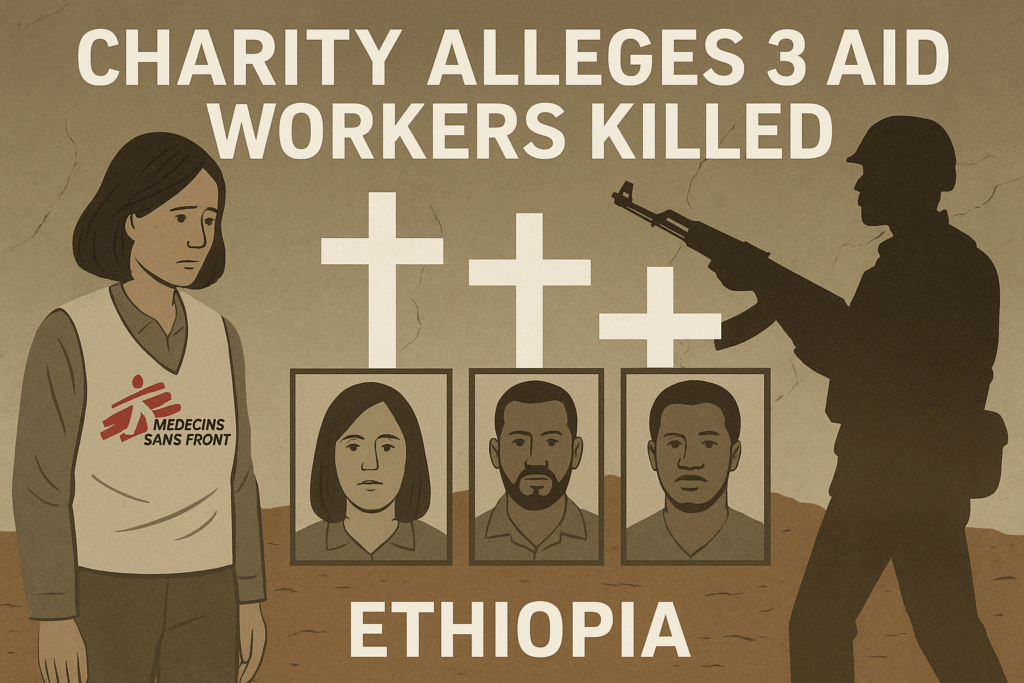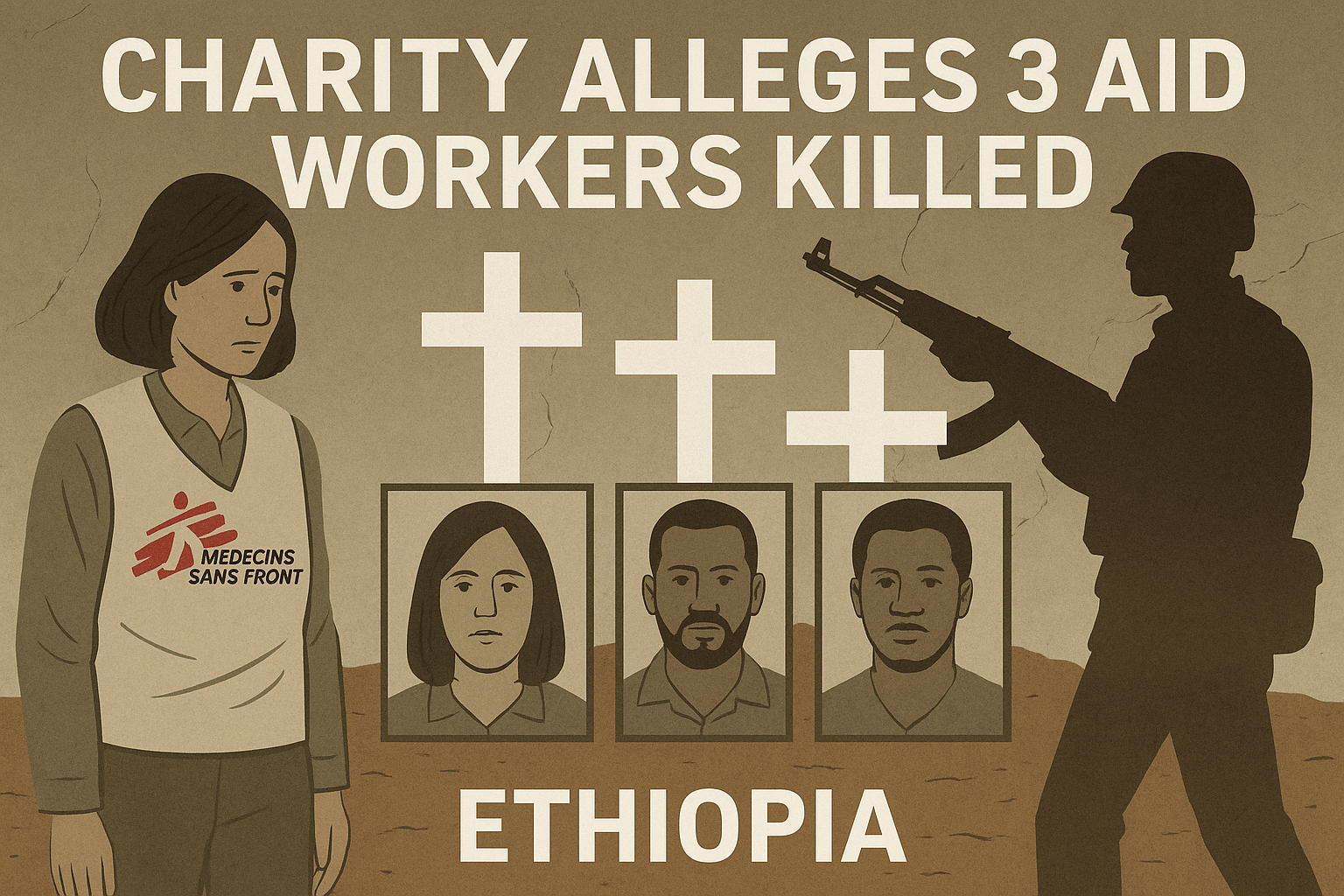In a disturbing revelation that has reignited global concern over the safety of humanitarian workers in conflict zones, a leading medical charity has accused Ethiopian government forces of executing three of its aid workers during the brutal Tigray war. The incident, which occurred in June 2021, took the lives of a Spanish national and two Ethiopian citizens working for Médecins Sans Frontières (MSF). Charity alleges 3 aid workers killed while on a medical mission, claiming the killings were intentional, targeted, and committed by government troops.
MSF Releases Detailed Report on Tigray Killings
MSF officially released its findings after a prolonged and frustrating four-year wait for a credible response from the Ethiopian government. Charity alleges 3 aid workers killed during a humanitarian operation in the war-torn Tigray region, describing the incident as one of deliberate execution.
Raquel Ayora, the general director of MSF Spain, spoke candidly to the BBC, stating, “They were executed. They were facing their attackers and were shot at very close range… several times.” The charity decided to go public with its conclusions after Ethiopian authorities failed to provide a credible explanation despite over 20 face-to-face meetings since the tragic incident.
Identities of the Victims and Circumstances of the Attack
The victims were 35-year-old Spaniard María Hernández Matas, 32-year-old Yohannes Halefom Reda, and 31-year-old Tedros Gebremariam. Charity alleges 3 aid workers killed while traveling through central Tigray on a mission to assess medical needs in communities devastated by conflict.
At the time of the attack, the victims were wearing visible MSF vests and traveling in a clearly marked vehicle with MSF’s flag and logos. MSF confirmed that the route had been shared with all fighting groups in the region, eliminating any possibility that the aid workers were mistaken for combatants. According to Ms Ayora, “They [Ethiopian troops] knew they were killing humanitarian aid workers.”
Background of the Tigray Conflict
The Tigray war erupted in late 2020 following a political fallout between Ethiopia’s federal government and the regional authorities in Tigray. Neighboring Eritrea soon joined forces with Ethiopia’s National Defence Force (ENDF), resulting in a bloody two-year conflict.
The war ended in 2022 through a peace deal brokered by the African Union (AU). Former Nigerian President Olusegun Obasanjo, who served as the AU’s envoy, estimated the death toll at approximately 600,000 people. Many perished due to fighting, starvation, and a lack of health services — a humanitarian catastrophe made worse by the targeting of aid workers. Charity alleges 3 aid workers killed during one of the conflict’s most violent periods.
MSF Investigation and Findings
MSF’s investigation into the killings was meticulous, relying on satellite imagery, eyewitness accounts, and publicly available information about Ethiopian military movements at the time. Charity alleges 3 aid workers killed at a precise location where Ethiopian forces were stationed.
According to witnesses, a military officer informed a local commander about a white MSF vehicle approaching. The commander reportedly ordered soldiers to open fire. When the car turned toward the town of Abi Adi and halted, the commander allegedly gave the chilling order to “go and catch them” and “remove them,” effectively ordering their execution.
The bodies of Ms Matas and Mr Yohannes were later discovered between 100 to 400 meters from their burned-out vehicle. Mr Tedros’ body, in keeping with MSF travel protocols, was found near the wreckage.
The Toll on Families and Communities
The deaths left a deep scar on both the victims’ families and the communities they served. Ms Matas, who had worked in Tigray prior to the conflict, was reportedly beloved by locals. Her death shattered her mother’s life, as she was her only child.
Similarly, Mr Tedros had become a father just before his death. His widow honored both her late husband and Ms Matas by naming their baby girl Maria, a poignant reminder of the human cost of war. Charity alleges 3 aid workers killed at a time when humanitarian organizations were struggling to deliver life-saving assistance to millions of Tigrayans trapped by violence and siege.
Lack of Accountability from the Ethiopian Government
MSF stated that despite consistent efforts to engage Ethiopian authorities over four years, they failed to receive a written or credible explanation. In mid-2022, the Ministry of Justice reportedly told MSF officials that their preliminary findings indicated no Ethiopian troops were present at the scene — a claim MSF refuted with evidence.
Charity alleges 3 aid workers killed and continues to call for justice, transparency, and accountability. “We won’t stop until we end impunity for attacks on humanitarian workers,” declared Ms Ayora.
The Growing Risk for Aid Workers Globally
The Tigray tragedy is part of a broader, alarming trend of violence against aid workers worldwide. The UN and humanitarian organizations have documented a rising number of attacks on relief workers in conflict zones, with perpetrators often enjoying impunity.
Charity alleges 3 aid workers killed in Tigray to highlight the increasingly perilous conditions for humanitarian staff. MSF noted that the hostility toward aid agencies worsened during the conflict, with multiple incidents of aid workers being detained, assaulted, and killed by armed groups and security forces.
International Response and Pressure on Ethiopia
Global human rights groups and humanitarian organizations have condemned the killings. Charity alleges 3 aid workers killed and has urged the international community to pressure the Ethiopian government to conduct a transparent and independent investigation.
The United Nations, the African Union, and several European governments have expressed concern about the safety of aid workers in Ethiopia. Yet, concrete action remains limited. The recent release of MSF’s report has reignited calls for accountability and protections for humanitarian operations in conflict areas.
Hope for Justice and Safer Futures
While the Ethiopian government has yet to respond formally to the latest report, MSF’s findings provide a clear, evidence-based account of the incident. Charity alleges 3 aid workers killed to remind the world that humanitarian workers are not combatants and must be protected under international law.
Ms Ayora emphasized the importance of this case, stating, “This isn’t just about MSF or these three individuals. It’s about the principle that aid workers should never be targeted and that those who commit such crimes must be held accountable.”
Conclusion
As the Tigray region begins to rebuild after years of conflict, the international community faces a crucial test in ensuring justice for victims and safeguarding aid workers. Charity alleges 3 aid workers killed not only as a testament to the sacrifices made by humanitarian staff but also as a rallying cry to end impunity for attacks on those who risk their lives to help others.
MSF’s unrelenting pursuit of answers serves as a powerful example of how charities and human rights advocates must persist, even when justice seems elusive. The case of María Hernández Matas, Yohannes Halefom Reda, and Tedros Gebremariam stands as a tragic reminder of the human cost of conflict — and the urgent need for accountability.

